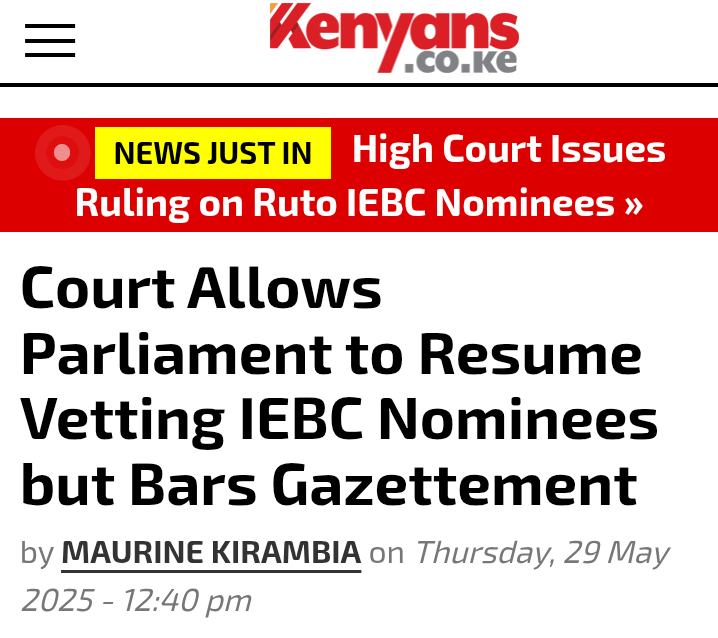The National Assembly is now allowed to continue with the vetting of the seven IEBC nominees after the High Court lifted the suspension on Thursday, May 29, 2025. This ruling gives Parliament the green light to go ahead with the interviews, but the court has made it clear that the final steps of swearing in and officially gazetting the nominees will have to wait.
The court wants to finish hearing a case that challenges how the seven nominees were selected before anything final can be done.Just a few days ago, this same court had blocked the process. It had stopped the approval of the nominees based on a petition filed by two individuals who had questions about the fairness and legality of the nomination process.
On May 19, the court ruled that vetting could not happen before May 29, giving both sides time to prepare and respond to the serious concerns raised in the petition.The nominees facing vetting include Erastus Edung Ethekon, who has been picked to become the new IEBC chairperson.

The other six Anne Nderitu, Moses Mukwana, Mary Karen Sorobit, Hassan Noor, Francis Odhiambo, and Fahima Abdalla have been nominated as commissioners. The nomination process has not been smooth.
It has faced many challenges, the biggest one being the petition that has accused the process of ignoring important steps like public participation, which had been recommended in the NADCO report.The petition also raised the issue that some people who were not shortlisted for interviews somehow ended up on the final list of nominees.
This has created a feeling that there may have been outside interference, possibly from people in powerful government positions. The petition calls the nominations unconstitutional and unlawful, arguing that they go against the rules of fair public appointments in the Constitution and several other laws governing how such appointments should be made.
It has also been said that the list of nominees does not show a fair balance of Kenya’s ethnic and regional diversity. It leaves out people with disabilities and was made without input from the opposition, which the petitioners believe is against the Constitution.
On top of this, there are claims that some of the nominees performed poorly in interviews and others may have problems related to their personal integrity.
Moses Wetang’ula, the Speaker of the National Assembly, had earlier set May 27 as the day the vetting would be done by the Parliamentary Justice and Legal Affairs Committee. But the plan was interrupted on May 14 when the two concerned citizens filed their petition in court. Now, while the vetting can move forward, the country must wait for the court to give a final decision before the nominees can be officially confirmed.


